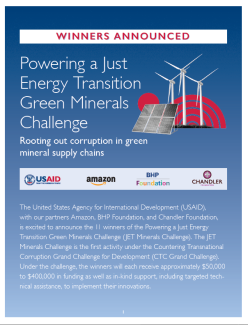The United States Agency for International Development (USAID), with our partners Amazon, BHP Foundation, and Chandler Foundation, is excited to announce the 11 winners of the Powering a Just Energy Transition Green Minerals Challenge (JET Minerals Challenge). The JET Minerals Challenge is the first activity under the Countering Transnational Corruption Grand Challenge for Development (CTC Grand Challenge). Under the challenge, the winners will each receive approximately $50,000 to $400,000 in funding as well as in-kind support, including targeted technical assistance, to implement their innovations.
The JET Minerals Challenge innovators are working at the forefront of new and innovative approaches to strengthen transparency, accountability, and integrity in the global rush to meet unprecedented demand for green minerals. Some of the innovators are introducing or scaling online platforms that allow for safe reporting on corruption; dissemination of information about payments, fees, and taxes; or facilitation of direct connections between small-scale miners and mineral buyers. Other innovators are engaging journalists, non-governmental organizations, local communities, or other stakeholders in the development of tools and processes that hold the mining industry accountable.
Their work is geographically and sectorally diverse, with four innovators pursuing multi-country initiatives to address transnational corruption and seven focused on a single country. Seven of the winning organizations are women-led, and nearly half are local organizations. Covering 15 countries in Africa, Asia, and Latin America, the innovators are targeting more than ten green mineral supply chains, including cobalt, copper, lithium, manganese, nickel, silver, and rare earth elements.
Join us in congratulating the winning innovators and read on to learn more about their approaches to counter corruption in green mineral supply chains.
Meet the JET Minerals Challenge Winners
- BASIS International Limited will scale an existing digital platform for reporting on corruption in green mineral supply chains in the Great Lakes region of Africa, which includes the Democratic Republic of the Congo (DRC), Tanzania, Uganda, and Zambia.
- In the DRC, Ghana, Mozambique, and Nigeria, the Centre for Journalism Innovation and Development will combine data aggregation, civic technology, investigative journalism, and capacity building to mobilize data for anti-corruption in the green minerals sector.
- In the DRC, IMPACT will help supply chain actors and communities monitor and defend against corruption more effectively by disseminating information about the payments, fees, and taxes applicable to artisanal and small-scale mining cobalt supply chains and their legal basis.
- The Initiative for Responsible Mining Assurance will enhance transparency around the impacts of extraction by co-creating, piloting, improving, and sharing tools for communities in Indonesia and South Africa.
- In Malawi, Perekezi ASM Consultants will leverage investigative journalism to increase the transparency and accountability of government agencies, as well as empower citizens and civil society by providing them with information that spurs dialogue about corruption in the green minerals supply chain.
- In Tanzania, Phimona Limited will scale Temisite, an application dedicated to auctioning minerals, increasing transparency, and promoting accountability in the trading process by enabling direct connections between small-scale miners and mineral buyers.
- In the DRC, Resource Matters will raise the cost of corruption in the country’s lithium and cobalt supply chains by conducting investigations into suspicious transactions, documenting any corrupt practices, and mapping the lithium supply chain.
- In the Philippines, the Manila Observatory will increase transparency around the impacts and benefits of mining by creating the Community Development Agreement Digital Innovation Hub, which integrates a database of mining-related community agreements and revenue transparency tools with contextual data and analysis of relevant international principles and legal frameworks.
- In Chile, Talisman International will launch a pilot for an easily accessible, free data platform that supports due diligence in the lithium value chain by providing structured data on patterns of corruption.
- In the DRC, The Impact Facility will address corruption in the trade and taxation of artisanal cobalt mining by introducing the Trust Merchant Bank’s Pepele Mobile payment platform to the artisanal cobalt trade.
- Transparency International Australia will pilot an updated version of its Responsible Mining Business Integrity tool with mining companies in Argentina, Colombia, Indonesia, Zambia, and Zimbabwe to identify corruption risks and strengthen their integrity and anti-corruption standards.
For more information about the winners and their work, view our fact sheet.
Follow the Journey
Follow along with the winners as they begin implementing their approaches to counter corruption and strengthen transparency, accountability, and integrity in green mineral supply chains. You can receive JET Minerals Challenge updates by visiting the CTC Grand Challenge website or joining our CTC Grand Challenge network by emailing us at challengecorruption@usaid.gov

